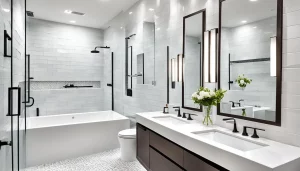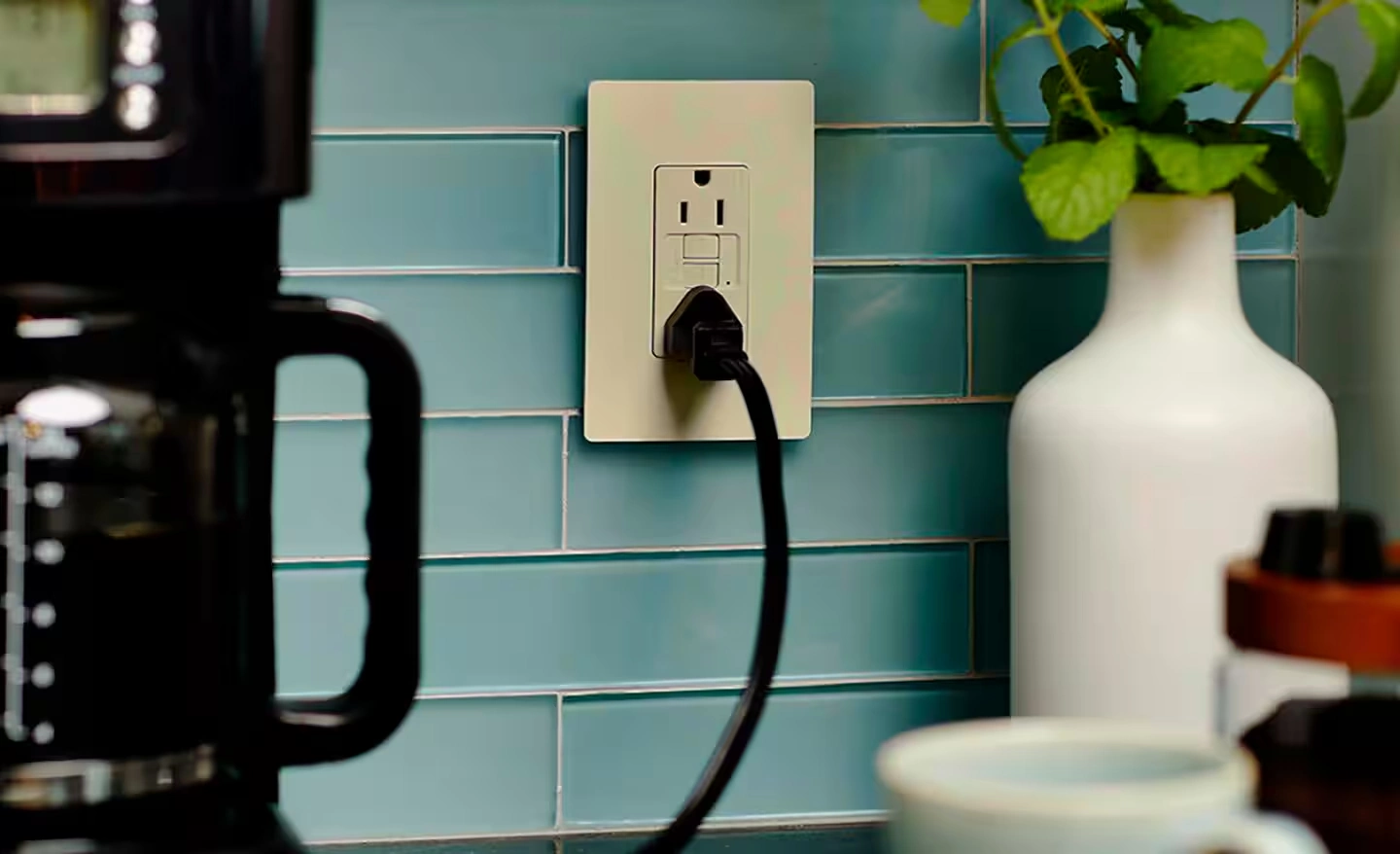Initiating a bathroom remodel requires a careful selection of materials that balance functionality and aesthetics. To achieve this, consider factors like durability, moisture resistance, and ease of maintenance. Natural stone, porcelain, and ceramic materials are popular for their water-resistant properties and aesthetic appeal. New materials with antimicrobial properties are also emerging as viable choices.
When choosing materials for a bathroom remodel, consider the most effective and visually appealing options. Materials with antimicrobial properties can now compete with traditional favorites like natural stone. With many options available, finding the right balance is key to a successful bathroom remodel.
Key Takeaways
- Durability and moisture resistance are key factors in selecting bathroom materials for improved functionality.
- Natural stone, porcelain, and ceramic materials are popular choices due to their water-resistant properties.
- Materials with antimicrobial properties help prevent bacteria and mold growth, enhancing bathroom hygiene.
- Sustainable materials like bamboo and reclaimed wood can improve bathroom aesthetics while minimizing environmental impact.
- The right materials can enhance the overall functionality and aesthetic appeal of the bathroom, depending on individual preferences and lifestyle.
Choosing the Right Bathroom Materials
Selecting the ideal materials for a bathroom remodel is essential to achieving a harmonious balance between functionality and aesthetics. The best materials for bathroom remodel must be durable, resistant to moisture, and easy to maintain. Considering the bathroom’s high-humidity environment, it is essential to choose materials that can withstand water exposure and prevent mold and mildew growth.
When evaluating bathroom materials, consider factors such as durability, maintenance requirements, and environmental impact. Natural stone, porcelain, and ceramic materials are popular choices for bathroom remodels due to their water-resistant properties and ease of maintenance. Additionally, materials with antimicrobial properties, such as those containing silver or copper, can help prevent the growth of bacteria and mold.
Ultimately, the right bathroom materials can enhance the overall functionality and aesthetic appeal of the space. By considering the unique demands of the bathroom environment and selecting materials that meet these demands, homeowners can create a bathroom that is both beautiful and functional. This careful selection is pivotal for a successful bathroom remodel.

Best Materials for Bathroom Countertops
Bathroom countertops are a focal point in the room, exposed to various elements such as water, soap, and personal care products, making their material composition a vital factor in a bathroom remodel. When selecting the best materials for bathroom countertops, it is essential to weigh durability, maintenance requirements, and aesthetic appeal.
Materials such as granite, quartz, and solid surface countertops are popular choices for bathroom remodels, offering a balance of functionality and style. Granite countertops are durable and resistant to heat and scratches, while quartz countertops provide a low-maintenance alternative with their non-porous surface. Solid surface countertops offer a cost-effective option with a wide range of color options. Marble and limestone countertops also add a touch of elegance to the bathroom but require more maintenance due to their porous nature.
Ultimately, the best material for bathroom countertops will depend on individual preferences, lifestyle, and budget. By understanding the benefits and drawbacks of each material, homeowners can make informed decisions and choose the best materials for bathroom remodel that suit their needs and enhance the overall aesthetic of their bathroom.
Bathroom Flooring Options and Trends
Numerous factors, including moisture resistance, slip resistance, and aesthetics, come into play when determining the ideal bathroom flooring for a remodel. Among the best materials for bathroom remodel, flooring options play a vital role in enhancing functionality and visual appeal. Porcelain and ceramic tiles are popular choices due to their water resistance, durability, and ease of maintenance. Natural stone, such as marble and granite, offers a luxurious look but may require more upkeep. Vinyl and luxury vinyl tile (LVT) are also viable options, providing a budget-friendly alternative with improved aesthetics.
When selecting bathroom flooring, one must take into account the specific needs of the space. For instance, textured or slip-resistant coatings can enhance safety in high-traffic areas. Additionally, radiant heating systems can be integrated into flooring materials like tile and stone for added comfort. In recent years, trends have shifted towards matte finishes, large-format tiles, and organic patterns, which can create a sense of calm and serenity in the bathroom. By carefully weighing these factors and trends, homeowners can choose the best materials for their bathroom remodel, resulting in a space that is both functional and visually appealing.
Walls and Shower Materials Comparison
When it comes to the walls and showers in a bathroom remodel, the choice of materials is crucial for creating a space that balances functionality and aesthetics. Homeowners seeking the best materials for bathroom remodels often consider factors such as durability, maintenance, and visual appeal. For walls, ceramic and porcelain tiles are popular options due to their water-resistance and ease of cleaning. Glass tiles and natural stone, such as marble and granite, can also be used to create a visually striking focal point.
In the shower area, materials like acrylic, fiberglass, and solid surface are often used due to their water-repellent properties and ease of installation. However, these materials may lack the luxurious feel of tile or natural stone. A popular alternative is a combination of materials, where tile or stone is used for the surround and a waterproof membrane is applied to protect the walls. This approach can provide both aesthetic appeal and functionality, making it an ideal choice for homeowners seeking the best materials for bathroom remodels. Ultimately, the choice of materials will depend on the individual’s preferences and priorities.
Sustainable Materials for Bathroom Remodels
Bamboo, a highly renewable resource, is ideal for bathroom flooring and countertops due to its water-resistant properties and durability. Reclaimed wood can be repurposed for bathroom vanities, cabinets, and shelving, reducing waste and minimizing the demand for new lumber. Low-VOC paints and coatings can substantially improve indoor air quality, creating a healthier bathroom environment.
When choosing sustainable materials for your bathroom remodel, consider the full lifecycle of the product, from sourcing to disposal. Look for materials with certifications such as FSC (Forest Stewardship Council) or Greenguard Gold, which guarantee the product meets rigorous environmental standards. By selecting sustainable materials, you can create a bathroom space that not only looks great but also promotes environmental responsibility and well-being.
Frequently Asked Questions
Can I Reuse Old Materials in My Bathroom Remodel?
Reusing old materials in a bathroom remodel is feasible, but it depends on the condition and compatibility of the existing elements with the new design. Assess the materials’ durability, safety, and aesthetic value before repurposing.
Do Bathroom Remodels Require Special Permits or Licenses?
Obtaining necessary permits and licenses is vital for a bathroom remodel, as it verifies compliance with local building codes and regulations, safeguarding homeowner and contractor interests, and preventing costly fines or rework.
How Long Does a Bathroom Remodel Typically Take to Complete?
Typically, a bathroom remodel’s completion time varies, ranging from several weeks to several months, depending on factors such as scope, complexity, and availability of materials and labor, averaging around 4-6 weeks for minor renovations.
Can I Perform a Bathroom Remodel on My Own?
Performing a bathroom remodel independently can be a challenging task, requiring extensive DIY experience and technical skills in areas such as plumbing, electrical work, and carpentry to guarantee a successful and safe outcome.
Are Bathroom Remodels a Good Investment for Resale Value?
Bathroom remodels yield a significant return on investment, with mid-range projects recouping approximately 64% of costs at resale, according to the National Association of Realtors, making them a strategic investment for homeowners.
Conclusion
Effective bathroom remodels rely on the strategic selection of materials to enhance functionality and aesthetics. Durable, water-resistant, and low-maintenance materials are essential for withstanding the bathroom environment. The integration of antimicrobial properties and sustainable options further contributes to a bathroom’s overall performance and appeal. By prioritizing these factors, bathroom remodels can achieve a harmonious balance of form and function, resulting in a superior and long-lasting space. Material selection is a critical determinant of a successful bathroom remodel.
Also Read: The Impact of Outdoor Space Design





